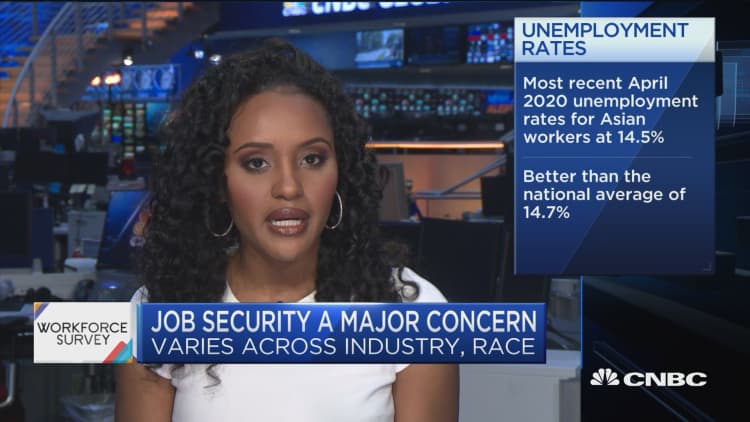After two months or more of shelter-in-place rules, some workers are starting to grapple with what might be an uncomfortable realization: maybe they're happier working from home.
In the latest CNBC|SurveyMonkey Workforce Survey, remote workers have a Workforce Happiness Index score of 75 out of a possible 100, topping the 71 among those who have continued to show up at workplaces. On nearly every question related to work satisfaction, those staying home report more positive measurements.
Remote workers are more likely than those who have been going into the office during the outbreak to describe themselves as very satisfied with their job (57% vs. 50%), to consider themselves to be well-paid (81% vs. 75%), to say that their company provides them with good or excellent opportunities for career advancement (66% vs. 58%), and to note that their contributions at work are valued a lot by their colleagues (54% vs. 48%).
These data come with an obvious caveat: the ability to work from home is a perk under normal circumstances, but it is an absolute privilege during a pandemic. Nationwide stay-at-home orders began in mid-March, but only about half of the 9,059 workers surveyed May 4-10 say they had been able to do their jobs remotely in the preceding weeks.
Those who have continued to show up to work in person are often doing essential jobs — providing health care or emergency services, staffing grocery stores, or delivering mail and packages — that may put them and their loved ones in danger.

In these uncertain times, working from home provides peace of mind. But before jumping to the conclusion that working from your couch rather than your cubicle will automatically make you like your job more, let's further disentangle the correlations between happiness and work.
Those who can do their job remotely are more likely to work full-time, to have a higher income, and to be employed in industries that have above average rates of job satisfaction—all factors that bolster self-reported happiness at work. Add in a global pandemic to the mix, and it's clear that the lowest paid, most tenuously employed workers are the ones bearing the brunt of the risk and the worry.
As it turns out, each of those three factors — job status, income, and industry — is a more significant contributor to job satisfaction than whether or not someone is able to work from home.
By wide margins, full-time workers are more likely than part-time workers to report being very satisfied with their job (57% vs. 44%), to be well-paid (79% vs. 72%), to have good or excellent opportunities for career advancement (64% vs. 54%), and to say their contributions are valued a lot by their colleagues (50% vs. 43%).
More than half of full-time workers (52%) have been able to work remotely in recent weeks, versus only 39% of part-time workers. But when drilling down to examine responses only among full-time workers, the distinctions between those who have been working remotely and those who have not are less striking. For example, 60% of full-time workers who've been working from home say they are very satisfied with their job, just six percentage points higher than the 54% of full-time workers who have been continuing to work in person.
Similarly, 48% of part-time workers who've been able to work from home say they're very satisfied with their job, once again six points higher than the 42% of part-time workers who have been continuing to work in person.
Those six percentage points gaps are less than half of the 13-point difference in job satisfaction between full-time and part-time workers overall, indicating that the overall comparison of happiness between remote and non-remote workers is magnified by the greater propensity of remote workers to be employed full-time.
Income and industry have less clear effects
There's no doubt that job satisfaction, no matter how you measure it, increases with income.
In the latest CNBC|SurveyMonkey data, just 45% of people making less than $50,000 say they are very satisfied with their job, compared with 69% among those making more than $150,000. Similarly, 55% of people making less than $50,000 say their company provides them with good or excellent opportunities to advance, compared with 77% among those making more than $150,000.
Factoring in whether someone has been working from home is a more complicated story. Among those making less than $50,000, remote workers are more likely than non-remote workers to say they're very satisfied with their job (50% vs. 43%) and that they have good or excellent career opportunities provided (61% vs. 52%).
Among workers in the middle and upper income brackets, remote work matters less — and in some cases, non-remote workers report greater levels of happiness. Though 71% of workers making more than $150,000 per year are working from home, the few who are not are actually slightly more likely to say they're very satisfied with their job (72% vs. 68%), with negligible differences on other measures.
Of course, aside from being highly correlated with job satisfaction and with the ability to work remotely, a person's income is also closely tied to the industry in which he or she works. That third factor is the biggest wildcard.
Certain industries — technology, consulting & research, and legal, for example—consistently have higher than average levels of happiness at work, while others — food & beverage, retail, etc.—regularly fall short. During this crisis, it just so happens that those industries with greater levels of happiness are, for the most part, the same industries that have moved a majority of their workforces to work from home. In that sense, too, the overall remote vs. non-remote job satisfaction split is a bit misleading.
Intra-industry comparisons can help provide some clarity. For the few industries that have enough people on either side, the comparisons in happiness between those working remotely and working in-person once again favor remote work. Those working in government, retail, and health care & pharmaceuticals, for example, all have better reports of happiness if they have been working remotely.
Teasing out the differences among workers before declaring an early victory for remote work is important, especially given the unusual circumstances that have thrown us collectively into our current work-from-home arrangements.
But so far, despite the Zoom meeting overload, the frequent interruptions from family members, and the lack of distinction between work and personal life, those who have been able to do their jobs from home during the coronavirus pandemic are happier than those who have continued to go in to their usual workplace. They're the lucky ones now, and they probably had it easier even before the coronavirus threat.








